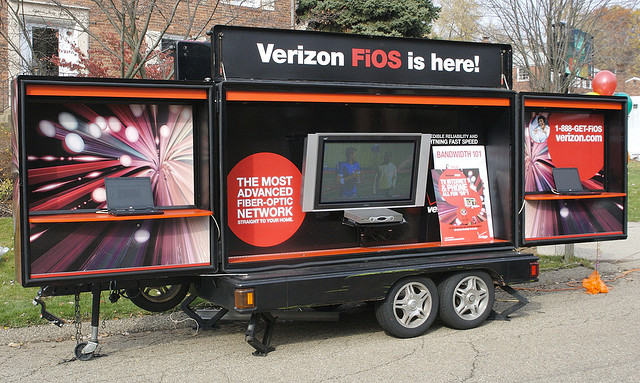
Verizon and Cogent today announced an interconnection agreement that should improve Internet quality for Verizon's FiOS and DSL customers.
The good news may be thanks partly to the Federal Communications Commission decision to reclassify broadband providers as common carriers, because Cogent could have complained to the FCC if the deal wasn't signed.
Cogent, a transit provider that distributes traffic on behalf of businesses that deliver services over the Internet, has fought bitterly with Internet providers such as Verizon over whether it should have to pay for connections to their networks. Cogent has maintained that the peering agreements should remain "settlement-free," without money changing hands, and says it won't have to pay Verizon under the new agreement.
The fights reached a fever pitch when Cogent was distributing traffic from Netflix, which accounts for about a third of North American Internet traffic during peak usage hours. Netflix agreed to pay Verizon for direct connections to its network last year, relieving much of the stress on the Cogent-Verizon connections.
But according to Cogent founder and CEO Dave Schaeffer, the Cogent/Verizon links are still "massively oversubscribed," causing performance problems when Verizon customers access the websites of Cogent customers. Cogent had threatened to file complaints to the FCC, as allowed by the commission's Open Internet Order.
But that won't be necessary, at least in the case of Verizon, because of today's agreement.
"Cogent and Verizon have entered into a long-term, bilateral commercial interconnection agreement related to their public IP networks," the companies said in their joint statement. "The interconnection agreement ensures customers on the two networks can continue to exchange data in an effective and efficient manner... The agreement contains provisions to add capacity and establish new interconnection locations between the two networks to stay ahead of growing traffic demands. The agreement also includes new connections for Verizon Digital Media Services' content delivery network to connect to Cogent's network globally, further improving quality for Verizon's CDN customers and Cogent's customers. This approach offers flexibility for each network while improving performance and reliability for the customers of both."
Verizon said it would not offer any comment beyond the joint statement made by Cogent and itself.
Schaeffer told Ars that it did not have to pay Verizon to get the deal signed. "We have never paid for peering, and we continue to never pay for peering," he said today.
Schaeffer said the FCC's rules "probably influenced the timing" of the agreement. He believes Verizon was also motivated to settle because Verizon's own EdgeCast content delivery network will benefit from distributing traffic through Cogent's network.
But there is still work to do to make sure performance improves. "The degradation exists right now, the ports are massively oversubscribed and our initial fix is going to dramatically increase the connectivity," Schaeffer said. "The parties agreed to make sure this doesn’t become a problem going forward."
The long-term agreement will cover multiple years, but the companies aren't saying how many. Verizon also recently made a nearly identical announcement of an agreement with Level 3, another network it has fought with. Level 3 declined to tell Ars whether it is paying Verizon.
Cogent has also had disputes with the likes of Comcast, AT&T, Time Warner Cable, and CenturyLink. Schaeffer said Comcast has been more reasonable than the other big ISPs lately, acting quickly to turn on additional ports when capacity is needed. There's still not enough capacity with AT&T, TWC, and CenturyLink, he said.
Cogent could file complaints against those companies beginning June 12 when the FCC's rules take effect.
"I sincerely hope I don’t have to file any, but I am also prepared. If any of the mass market ISPs violate the consumer protection provisions outlined in the Open Internet Order, we will go to the Enforcement Bureau and file a complaint," Schaeffer said.
Netflix hasn't publicly ruled out the possibility of filing complaints about the paid interconnection agreements it made with Comcast, AT&T, Time Warner Cable, and Verizon. Netflix also argued that it should be provided with free peering, but decided to pay the big ISPs anyway.
A Netflix spokesperson told Ars today that the company has not decided whether to file any complaints.
reader comments
53